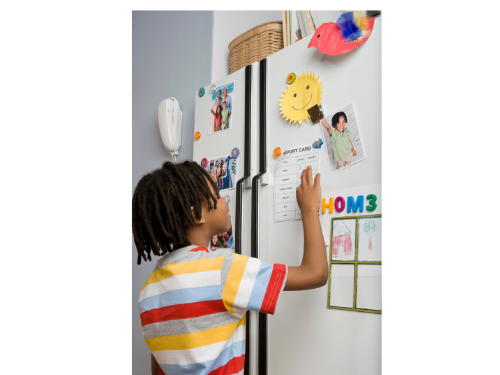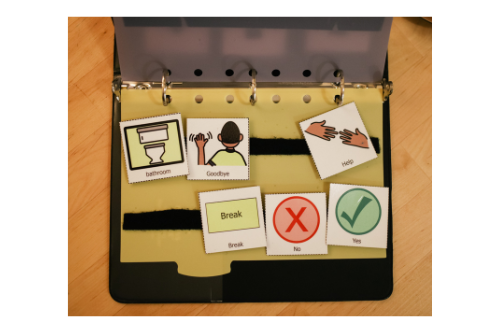“I need help!”

As a School Psychologist, I work with educators and parents to support children with behavior challenges. Behavior challenges can take many forms including defiance, aggression, off-task behavior, and eloping, among others. I want to share with you my 5 most recommended, evidence based interventions.
Many times, the child I’m supporting also has a disability such as Autism, Intellectual Disability, Attention Deficit Hyperactivity Disorder, or a learning disability. However, any child can exhibit behavior challenges at some time or another.

Behavior ALWAYS Tells Us Something
Behavior challenges can feel very overwhelming to parents and educators because behavior challenges can feel very personal to the person experiencing the behavior challenge. Experience has taught me that behaviors are a way for a child to get a need met or communicate something with us in a maladaptive way. Our job as parents and educators is to help children find better or more appropriate ways of getting their needs met.
While there are a mind-boggling number of articles stating that they have the “latest and greatest” tricks and tips to manage behavior, I have found that there is no “one size fits all” way to help manage behavior.
What are Evidence-Based Interventions?
When consulting with my fellow educators and parents, I often recommend evidence-based interventions to use to help manage children’s behavior challenges.
Evidence-based interventions are approaches and techniques that have been thoroughly researched, tested, and proven to be effective in addressing specific challenges or promoting positive outcomes in children. These interventions are grounded in scientific evidence and are designed to provide you with the most reliable and successful tools to support your child’s growth.
I know that your time is precious, and there are lots of things to do. I only want to share with you interventions that have been proven to actually WORK!

The Importance of Evidence-Based Interventions
Now, you might be wondering, “Why should I prioritize evidence-based interventions?” Well, here are a few reasons:
a) Scientific Backing: These interventions are not mere guesswork or anecdotal advice. They have undergone rigorous scientific study and scrutiny to ensure their effectiveness.
b) Tailored Solutions: Evidence-based interventions are often tailored to address specific issues or challenges your child may be facing, be it behavioral, emotional, or educational. This targeted approach increases the likelihood of positive outcomes.
c) Maximized Outcomes: By utilizing evidence-based interventions, you can optimize your efforts and resources to make a lasting impact on your child’s development.
You deserve to have confidence in the strategies you choose!
My most recommended Evidence-Based Interventions:
Here are my top 5 favorite, and most recommended evidence-based interventions.
- Visual Supports: Visual Supports are any tool presented visually that supports an individual as he or she moves through the day.
This could include written words, using objects within the environment, arranging the environment or using visual boundaries, using schedules, maps, labels, organization systems, or timelines.

- Communication Systems: There are many different types of communication systems that you can use to support your child. EVERYONE deserves to be able to communicate.
If your child struggles with communication, it is important to have a Speech and Language Pathologist and possibly even an Augmentative Alternative Communication specialist on your child’s team to help determine ways to aid your child’s communication.
As I mentioned above, behavior is often a way to communicate a need, and we want our children to be able to communicate effectively what they need 🙂

- Social Skills Training: This intervention equips children with the necessary social skills to navigate social interactions successfully. Research has shown that social skills are as necessary as academic skills in helping children navigate the world. Having social skills can help children build relationships, communicate effectively, and resolve conflicts with others.
Social skills training refers to any adult-directed instruction in which social skills are targeted for improvement. This can be done in a large group, small group, or one-on-one.

- Reinforcement: Reinforcement is a powerful tool that we utilize when we are teaching new behaviors as well as when we are maintaining behaviors.
Using reinforcement strategies appropriately increases the future frequency of the behavior that immediately precedes it.
We often talk about “positive” and “negative” reinforcement.
Positive reinforcement offers when something is added to the behavior that increases the future frequency of that behavior. This could look like giving your child a treat or a high five after completing an assignment.
Negative reinforcement occurs when something is removed following a behavior that increases the future frequency of that behavior. This could look like giving your child a break after doing their homework.
It’s important to note that for these terms, positive and negative, we are thinking in terms of “adding” (positive reinforcement) and “removing” (negative reinforcement) not “good” or “bad”.

As adults, we all love to get treats, paychecks, take a break, or get kudos for a job well done. Our kids do too 🙂 Using reinforcement effectively can help increase appropriate behavior and on-task behaviors.
- Exercise: Building in exercise throughout the day can be a game changer for improving a child’s behavior. Exercise can be super regulating for children (and adults too, who am I kidding !?). Exercise could be a walk around the neighborhood, swimming, jumping on the trampoline, or any activity that gets the body moving. Exercise can also be a great bonding opportunity when done with an adult.

Collaborating with Professionals
While you can incorporate evidence-based interventions into your parenting routine, remember that professionals in the field are invaluable resources. They can provide guidance, expertise, and tailored interventions to meet your child’s needs. Collaborating with professionals can enhance your understanding and ensure that you are implementing interventions correctly.
By using evidence-based interventions, you are taking an active role in supporting your child’s development. Remember, evidence-based interventions are tools to empower you on this parenting journey, but they are not one-size-fits-all solutions. Every child is unique, so be patient and open to adapting these interventions as needed.
Trust your parenting instincts
As you continue to learn and grow, trust your instincts, seek support when needed, and celebrate the small victories along the way. Your dedication and love are the most powerful tools in nurturing your child’s potential. You’ve got this! I’d love to hear how these work for you! If you need help implementing them or need someone to bounce ideas off of, feel free to contact me for a consultation.





